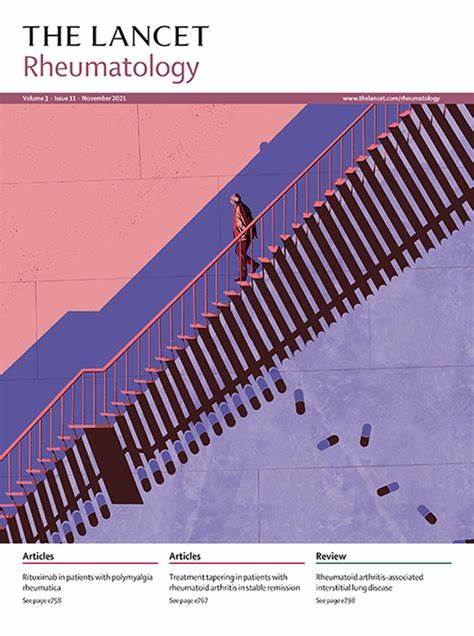ERN ReCONNET-SLICC-SLEuro专家对罕见系统性红斑狼疮表现的治疗管理达成共识。
IF 15
1区 医学
Q1 RHEUMATOLOGY
引用次数: 0
摘要
现有的系统性红斑狼疮(SLE)指南主要集中在常见和主要器官的累及。成立了一个由三个SLE专家组(即欧洲罕见和复杂结缔组织和肌肉骨骼疾病参考网络、系统性红斑狼疮国际合作诊所组和欧洲狼疮协会)专家组成的国际工作组。共有119名参与者参与了24种罕见SLE表现的共识治疗策略的制定,采用了多步骤的过程。对于SLE肠炎和胰腺炎,专家建议使用羟氯喹、糖皮质激素、环磷酰胺或霉酚酸酯。罕见的肺部疾病,如肺炎,如果严重,也用环磷酰胺治疗,如果不严重,也用霉酚酸酯治疗。对于心肌炎患者,推荐羟氯喹、糖皮质激素、环磷酰胺或霉酚酸酯治疗。对于中枢神经系统的表现,羟氯喹、糖皮质激素、环磷酰胺或霉酚酸酯是常见的治疗选择。对于罕见的皮肤表现,首选的策略是羟氯喹和糖皮质激素与无硝唑单抗或霉酚酸酯联合使用。这种基于专家的共识为指导治疗决策提供了一个有价值的框架,在现有建议可能不足或不适用的情况下。本文章由计算机程序翻译,如有差异,请以英文原文为准。
ERN ReCONNET–SLICC–SLEuro expert consensus on the therapeutic management of rare systemic lupus erythematosus manifestations
Existing guidelines for systemic lupus erythematosus (SLE) predominantly focus on common and major organ involvements. An international taskforce involving experts from three SLE expert groups (ie, the European Reference Network on Rare and Complex Connective Tissue and Musculoskeletal Diseases, the Systemic Lupus Erythematosus International Collaborating Clinics group, and the European Lupus Society) was established. A total of 119 participants contributed to the development of consensus therapeutic strategies for 24 rare SLE manifestations, using a multistep process. For SLE enteritis and pancreatitis, experts recommended hydroxychloroquine, glucocorticoids, and cyclophosphamide or mycophenolate mofetil. Rare lung conditions such as pneumonitis were also managed with cyclophosphamide if severe or with mycophenolate mofetil if not severe. SLE for myocarditis with hydroxychloroquine, glucocorticoids, and cyclophosphamide or mycophenolate mofetil, are recommended based on severity. For CNS manifestations, hydroxychloroquine, glucocorticoids, and cyclophosphamide or mycophenolate mofetil were common choices for treatment. For rare skin manifestations, the preferred strategy was a combination of hydroxychloroquine and glucocorticoids with anifrolumab or mycophenolate mofetil. This expert-based consensus provides a valuable framework for guiding therapeutic decisions where the available recommendations might be insufficient or inapplicable.
求助全文
通过发布文献求助,成功后即可免费获取论文全文。
去求助
来源期刊

Lancet Rheumatology
RHEUMATOLOGY-
CiteScore
34.70
自引率
3.10%
发文量
279
期刊介绍:
The Lancet Rheumatology, an independent journal, is dedicated to publishing content relevant to rheumatology specialists worldwide. It focuses on studies that advance clinical practice, challenge existing norms, and advocate for changes in health policy. The journal covers clinical research, particularly clinical trials, expert reviews, and thought-provoking commentary on the diagnosis, classification, management, and prevention of rheumatic diseases, including arthritis, musculoskeletal disorders, connective tissue diseases, and immune system disorders. Additionally, it publishes high-quality translational studies supported by robust clinical data, prioritizing those that identify potential new therapeutic targets, advance precision medicine efforts, or directly contribute to future clinical trials.
With its strong clinical orientation, The Lancet Rheumatology serves as an independent voice for the rheumatology community, advocating strongly for the enhancement of patients' lives affected by rheumatic diseases worldwide.
 求助内容:
求助内容: 应助结果提醒方式:
应助结果提醒方式:


